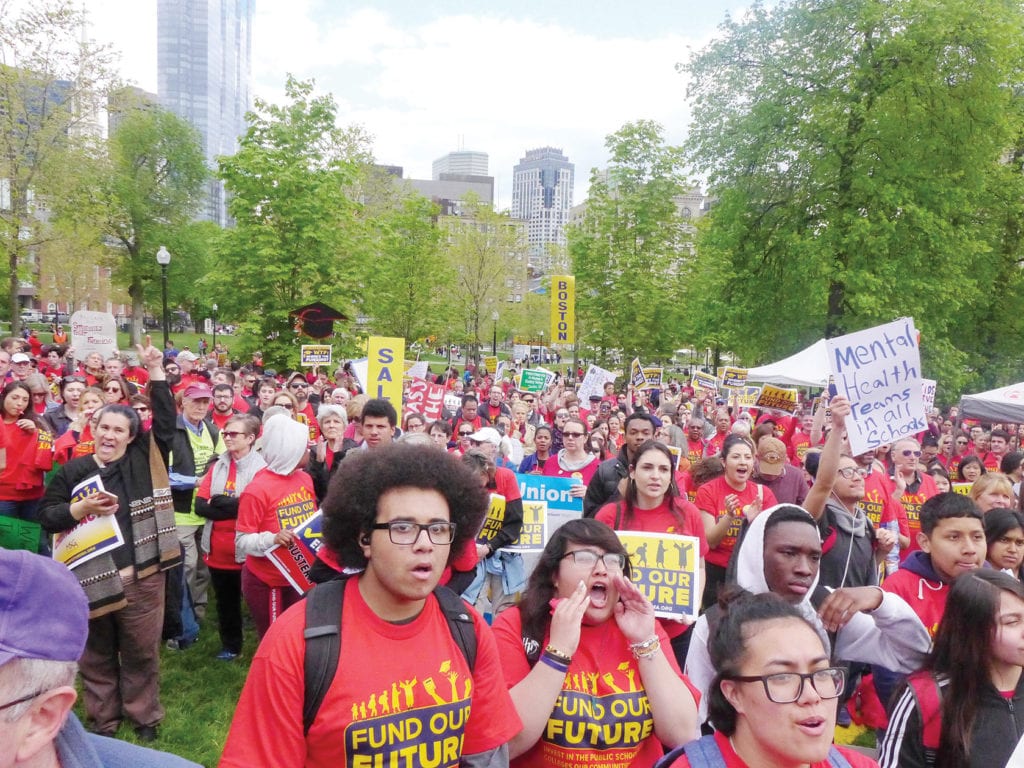Mass. teachers part of national movement
Rally draws on nationwide ‘Red For Ed’ demonstrations

The teachers, students and parents who marched through the State House last week are part of a national trend of activism aimed at reversing years of cuts to public education systems across the country.
While the most visible sign of the pro-public-education movement is the ongoing wave of teacher strikes that has hit states such as Oklahoma, West Virginia and Arizona, the movement in Massachusetts to increase funding for education is drawing from the same backlash against funding cuts and privatization efforts that many say have undermined public education in the United States.
“For us to be one of the wealthiest states in the country, there’s no excuse for students not getting the resources they need,” said Boston Teachers Union President Jessica Tang, who ticked off a list of unmet needs in schools across the commonwealth: arts and music instruction, libraries and librarians, nurses, counselors, special education staff.
“We’re standing up and saying, ‘No more underfunding of our public schools,’” she said.
Last week’s rally came as legislative leaders are considering dueling visions of education funding reform for Massachusetts.
The Promise Act, which is supported by the state’s teachers unions, would increase state education funding by $1 billion, raising the amount of state dollars going to low-income cities such as Brockton and New Bedford as well as the funding going to wealthier communities such as Boston.
At the same time, Gov. Charlie Baker has proposed a more modest $500 million funding increase, phased in over seven years, that would primarily benefit lower-income cities and towns and result in no meaningful increase in funding for Boston.
It’s unlikely that either proposal would be able to raise education funding without the addition of new revenue into the $42 billion state budget. So far, the Fair Share Amendment is the only tax increase on the table. It would raise more than $1 billion a year by taxing income above $1 million at 9 percent. But that amendment would require a change to the state’s constitution — a four-year process involving a statewide ballot initiative.
While some in legislative leadership have expressed reservations about the Promise Act, including House Education Committee Chairwoman Alice Peisch, the teachers unions demonstrated considerable support with last week’s rally and the Promise Act has support from municipal leaders including Boston Mayor Martin Walsh.
The unions’ push for increased education resources for local school districts taps into the national “Red for Ed” movement of teacher strikes. The thousands of students, teachers and parents who flooded the Common last week wore bright red T-shirts bearing the message “Fund our future.”
“We definitely feel the momentum,” said Beth Kontos, president of the American Federation of Teachers Massachusetts. “Most of the legislators say they’re on our side. We just need to get the budget to reflect that.”
The union-backed rally, held on May 16, stood in stark contrast to a smaller rally held two days earlier by Massachusetts Parents United, a group funded by the Walton Foundation and other corporate groups that have traditionally favored school privatization. But that group has significant support on Beacon Hill. Baker’s Education Secretary, Jim Peyser, spoke at that rally, repeating the administration’s call for greater state intervention into struggling school districts.
“I’m not saying we don’t need more money,” Peyser said, quoted in the Statehouse News Service. “We do need more money for our schools, especially in those communities that don’t have the wherewithal to invest their own resources at the level that is necessary to build the skills and educational achievement of their kids. But how much we spend is only as important as how well we spend those funds.”
In Boston, state intervention into schools deemed “failing” under the Department of Elementary and Secondary Education’s accountability system has had mixed results. At the Dever School in Dorchester, state officials turned over operations to a private startup education management company called Blueprint, which cycled through six school leaders during its three-year tenure there for which the firm received $1.5 million. State officials returned control of the school to BPS in 2017, after a sharp drop in enrollment and no improvement in student performance.
At the May 14 Massachusetts Parents United rally, parents bused in from communities as far away as Springfield wore blue shirts with the message, “Our kids are not entering your school to prison pipeline” and gathered on the sidewalk in front of the State House.
At the union-backed rally, red-shirted demonstrators gathered on the Common behind the bas relief of the Massachusetts 54th Regiment, filling a sizeable portion of the park. Elected officials, including Promise Act author Sen. Sonia Chang-Diaz and Senate Education Committee Chairman Jason Lewis attended the event, as did House members and several Boston city councilors.
Facing the competing education funding bill from Baker and House leadership that has been reluctant to raise new revenues, the union-backed movement is up against a challenging environment for the bold investment in education they seek. But Massachusetts Teachers Association President Merrie Najimy said her union is ready for a major campaign.
“Today is the beginning,” Najimy told the Banner. “If the next year doesn’t bring increased funding, we’re going to be stepping out into the neighborhoods and bringing the fight to the communities the elected officials represent.”
Kontos said the AFT, too, is committed to winning the fight for funding.
“We’re going to keep plugging away at this until they do the right thing,” she said.







